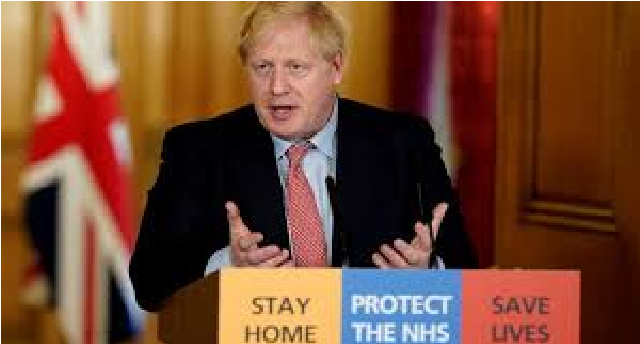British Prime Minister Boris Johnson on Thursday left intensive care after three days of treatment for COVID-19, his office said.
“The Prime Minister has been moved this evening from intensive care back to the ward, where he will receive close monitoring during the early phase of his recovery,” a statement said.
“He is in extremely good spirits,” it added.
The 55-year-old Conservative leader had received “standard oxygen treatment” after he was transferred to the intensive care unit at London’s St Thomas’s hospital on Monday, his spokesman said earlier.
While much of the focus in Britain has been on Johnson’s health, there is also concern over the numbers of people infected with the virus, with the government set to extend a lockdown implemented on March 23.
The government announced another 881 deaths on Thursday, taking the UK total to 7,978.
– ‘We’re not done yet’ –
Senior ministers discussed the strict social distancing measures, initially planned for three weeks, during a daily coronavirus response meeting.
Foreign Secretary Dominic Raab, who is standing in for Johnson, warned that the lockdown, which was to end on Monday, was not likely to be lifted imminently, saying “we’re not done yet, we must keep going.
“Deaths are still rising and we haven’t yet reached the peak of the virus, so it’s too early to lift the measures,” he said.
“We don’t expect to be able to say more on this until the end of next week,” he added.
Greater Manchester Police said Thursday it had to break up 660 parties last weekend.
Asked if the British government might give police extra powers during the lockdown, the Downing Street spokesman said: “For now our focus is on ensuring that the steps that we already have in place are properly enforced”.
– ‘Protect the NHS’ –
Meanwhile, ministers warned the public to follow social distancing rules ahead of the Easter weekend when high temperatures are forecast.
“We’ll have to stay at home and the reason why we’re having to stay at home is in order to protect the NHS and save lives,” added Dowden.
Johnson was hospitalized Sunday over concerns he still had a cough and high temperature 10 days after being diagnosed with coronavirus.
He had spent the previous nine days in self-isolation in a flat above his Downing Street office.
He has received messages of support from around the world, with US President Donald Trump sending best wishes to his “very good friend”.
Russian leader Vladimir Putin said Johnson’s “energy, optimism, and sense of humour” would see him through.
The British government has been criticized for a slow response to the pandemic, initially refusing to follow other European countries in requiring people to stay home as the virus spread rapidly across the globe.
Johnson himself said in early March that he was still shaking hands with people — only for COVID-19 to sweep through the British establishment weeks later.
The government has insisted its coronavirus response has been led by medical and scientific evidence throughout.
Elsewhere in the UK, Southampton became the first top-level club to defer players’ wages amid a growing row about whether Premier League footballers — with an average salary of three million pounds ($3.7 million) — should give up some of their pay to help the nation.
Source: Channels TV













